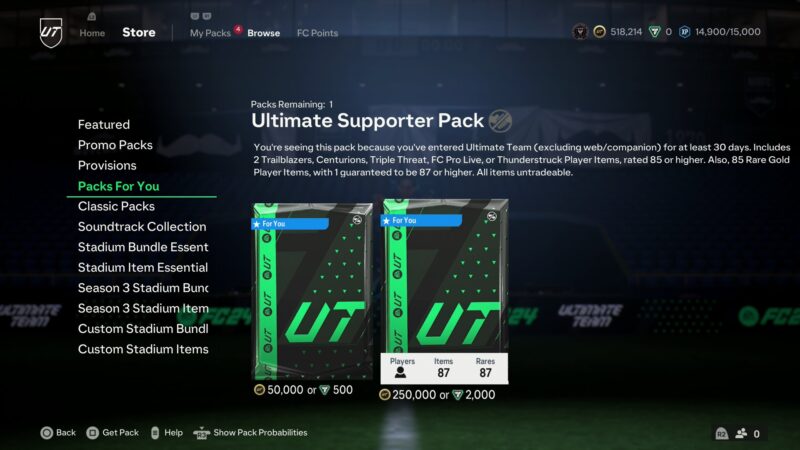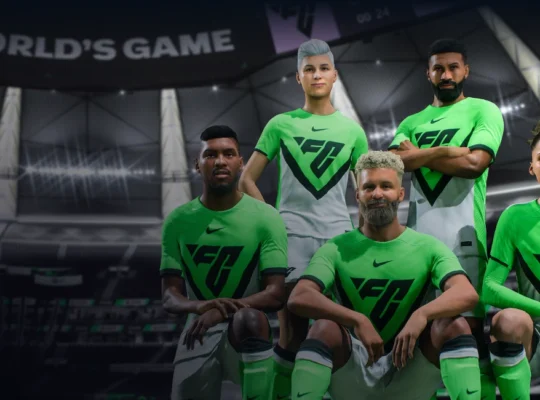Loot boxes, prevalent in modern video games, have become a subject of intense scrutiny and controversy, particularly in titles like the EA Sports FC franchise. In the Football Ultimate Team (FUT) mode, Electronic Arts (EA) has crafted a monetisation model that relies heavily on selling loot boxes, making it a significant revenue stream for the company. However, implementing loot boxes in FUT has sparked concerns regarding their potentially predatory nature and impact on players, particularly younger audiences.
The Nature of Loot Boxes in FUT
FUT revolves around the concept of building and managing a virtual football team by acquiring player cards through various means, including purchasing packs using in-game currency or real money. These packs contain a randomised assortment of player cards, with the rarest and most desirable ones often being extremely difficult to obtain. This element of chance is what defines loot boxes, with players essentially gambling on the contents of each pack they purchase.

Criticisms and Concerns
Critics argue that the random nature of loot boxes in FUT mirrors traditional gambling, with players spending real money in the hopes of obtaining valuable items or players. This can lead to addictive behaviour and financial exploitation, particularly among younger players who may not fully grasp the risks involved. Furthermore, the temptation of obtaining rare and coveted player cards can create a sense of pressure to spend more money on packs, exacerbating the issue of excessive spending.
Callum Dornan’s Campaign
Callum Dornan, the founder of British eSports organisation Serious About FIFA (SAF), has taken a bold step in his campaign to regulate loot boxes in the UK, shedding light on the pervasive issue of FC points addiction and advocating for measures to protect vulnerable players. With his recent announcement on social media, Dornan has ignited a crucial conversation about the ethical and legal implications of loot boxes in video games, particularly in the FC franchise.
Its time to regulate loot boxes (FC Packs)
Starting a campaign to make real change within the UK (and hopefully worldwide)
If you agree with the below, please make sure to share and support pic.twitter.com/E6O6Yp6IU5
— SAF Cal (@saf_cal) February 15, 2024
Dornan’s personal journey with FC points addiction lends a poignant authenticity to his campaign as he seeks to raise awareness about the detrimental effects of excessive spending on loot boxes. By sharing his own struggles and experiences, as well as sharing messages he has received from others going through a similar struggle, he hopes to empower others to break free from the grip of addiction and prevent future generations from falling into the same trap.
Global Efforts to Regulate Loot Boxes
The use of loot boxes in video games has drawn significant attention and action across the globe, with governments, consumer protection agencies, and advocacy groups in various countries pushing for regulation to mitigate their potential harm. Notably, Belgium declared loot boxes illegal, classifying them as games of chance and demanding their removal from popular games under threat of fines, while the Netherlands is pushing for a complete ban at EU level. Similarly, Brazil is advancing legislation to ban them, reflecting concerns over player well-being and consumer rights.

In response to these challenges, courts in Austria have ruled against major gaming companies like Electronic Arts and Sony for violating gambling laws with loot boxes, ordering compensation for players. Germany and Australia have tightened regulations, requiring games containing loot boxes to carry higher age ratings or explicit warnings about simulated gambling. Additionally, Taiwan and South Korea, among others, now require clear disclosures about loot box odds, aiming to foster transparency and responsible gaming.
In the UK, earlier campaigns by parliamentarians and consumer advocacy groups to classify loot boxes as gambling and regulate them did not result in legislative change, despite highlighting concerns over transparency and the risk to younger players.
Industry Resistance and Reluctance
One of the primary reasons for the limited success of previous campaigns to regulate loot boxes in Ultimate Team is the resistance from game developers and publishers, particularly Electronic Arts (EA Sports), the creator of the FC franchise. EA Sports has defended its use of loot boxes as a legitimate and optional feature of the game, arguing that they are “surprise mechanics” that provide players with a sense of excitement and progression.
They argue that 90% of people who play Ultimate Team do not spend real money to open packs, instead they are using coins which are earned in-game instead. They have maintained that they have ethically utilised the loot box mechanics in their games. Despite this, the company has continued to be criticised for releasing increasingly predatory packs and announcing record revenues despite growing frustration from its player base.

The gaming industry as a whole has been reluctant to embrace regulatory oversight, preferring self-regulation and voluntary guidelines over government intervention. This reluctance has made it challenging for campaigners to enact meaningful change and hold companies accountable for their monetisation practices.
Ultimately, the debate over loot box regulation raises fundamental questions about the intersection of gaming, gambling, and consumer protection. As Dornan’s campaign gains momentum and public awareness grows, policymakers will face increasing pressure to take action and safeguard the interests of players, particularly those most vulnerable to the allure of loot boxes. The outcome of this debate will shape the gaming industry’s future and determine the extent to which it prioritises player well-being over profit.










